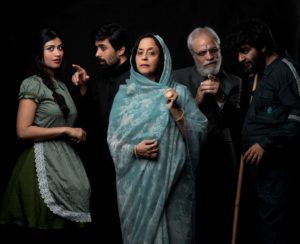Bhas’ Play: Madhyam Vyayog(Turan Kalangi)
 Playwright: Mahakavi Bhasa
Playwright: Mahakavi Bhasa
Director: Hafiz Khan
Group: Ankur Rangmandal Samiti, Madhya Pradesh
Language: Malwi & Rajasthani
Duration: 1 hr 10 mins
The Forms
Maach is a folk theatre form of Malwa region of Madhya Pradesh, started in Ujjain by Guru Gopalji of Bhagsipura.
Turra Kalangi form of poetic and musical dialogues was jointly initiated by two saints Tukhangir and Shah Ali. Tukhangir was a Gusaain saint who wore saffron clothes and worshipped Shiva. Shah Ali was a Muslim Faqir who wore green and worshipped Shakti. Yet, both these forms have some common features.
The Play
A Brahmin family is passing through the forest where the exiled Pandavas are dwelling. The family encounters Ghatotkacha who is in search of a human for his mother Hidimba’s meal. He holds the family captive and asks them to decide who should accompany him. The eldest son of the family being dear to the father, and the youngest to the mother, the middle son is the only choice left to be handed over to Ghatotkacha. Being the middle one he is called ‘Madhyama’. Madhyama is thirsty and requests Gatotkacha to be allowed to go to a nearby pond for water. Ghatotkacha agrees and asks him to return quickly. But Madhyama gets delayed and Gatotkacha starts calling out to him, “Madhyama…Madhyama…” Bhima, who was passing by, and he too being the middle son (Madhyama), thinking that someone is calling out to him, reaches where the family is being held captive. On hearing the story of the family, he offers himself as Hidimba’s meal, on the condition that Gatotkacha defeats him in a duel. Gatotkacha defeats Bhima in a wrestling bout and takes him to his mother only to discover that Bhima is his father.
The Director
Hafiz Khan graduated from National School of Drama in 1981. He has been actively working in theatre, especially in the field of Children’s theatre. He has been the founder member of the TIE Company of NSD. He has also been a part of many theatre workshops organized by NSD all over the country. As he was born and brought up at Ujjain, the local folk forms have always attracted him. The present production is the result of one such workshop.
The Co-Director
Born on 11th of October 1963 in village Nayakhe of district Ujjain, Babulal Deora, at the age of 15,
joined Lokarg and Tejati Maharaj Katha Group and started his association with the folk theatre ‘Maach’. His initial inspirations were Guru Shri Siddheshwarji Sen and his elder brother Ratan Maharaj Lokesh Sen. He started as a chorus singer in the group. He continued the tradition after his guru died.
Director’s Note
I had conducted a workshop on Turrakalangi in December 2014 at Ghosunda, Chittor village. The workshop began with Kalangi Ustad Mirza Akbar Baig Kaghzi and Turra Ustad Narayanji Joshi, and around 20 artists of Turralalangi. I felt as if I was transported to Indra’s Darbar 300 years ago where Turrakalangi was Khayal, and Khayal was Maach. If one was to forget the intricacies of music and Rag-Raginis, then one finds that the form of rhythm, melody, abhinaya, singing and storytelling are all common in both. Thus, we selected Madhyam Vyayog of the great Sanskrit playwright Mahakavi Bhasa to be presented as a bouquet of Turrakalangi Khayal and Maach by the artists of Ujjain.
The Playwright
Mahakavi Bhasa (5th Century B.C.) was an Indian playwright who wrote in Sanskrit. His plays were lost to the world until 20th century A.D. when his manuscripts were rediscovered. Some of his available plays are Swapnavasavdutta, Pratibha-Natak, Panch-Ratra, Madhyam Vyayog, Doot Gatotkach, Urubhangham, Karnabharam, Hari Vansh, Abhishek Natak etc.
The Group
In the past four decades Ankur Rangmanch Samiti Ujjain has organised numerous theatre festivals, theatre camps, workshops and theatre productions. The primary objective of the group is education, literacy, health, social sciences and social justice. It uses regular theatre, children’s theatre, educative theatre, folk theatre, literature and art as its medium. The group has participated and organised events in collaboration with the Ministry of culture (Govt. of India), Sangeet Natak Akademi, National School of Drama (New Delhi), Madhya Pradesh Kala Parishad, Madhya Pradesh Museum, Kalidas Akademi Ujjain and many local organisations. Malwa Maach organised in 1999, 2005, 2007, 2016, 2017, 2018 and 2019 have been known for a wider promotion of this folk tradition.
Cast & Credits
Sutradhaar1 Babulal Deora
Sutradhaar2 Rajesh Bhati
Hidimba Vishnu Chandel
Ghatotkach Narendra Bhanvariya
Brahmin Tikaram Bhati
Brahmani Seema Kushwah
Son 1 Dilip Chauhan
Madhyam (Son 2) Sonu Bodana
Son 3 Chirag Chandel
Bhima Sudhir Sankhla
Harmonium Ramesh Aswaar
Dholak Pappu Chauhan
Tek Raju Bhati
Synthesizer Nilesh Manohar
Costume & Make-up Vishal Mehta
Stage Management Irshad Khan
Set Ivan Khan
Light Operation Amit Bhandari
Production Design Kailash Chauhan
Stage Manager Prakash Bhatia
Co-ordinator Shailendra Vikal
Playwright Mahakavi Bhas
Co-Director Babulal Deora
Director Hafiz Khan
Contacts
Ankur Rangmanch Samiti
C/o Vishal Steel, 64 Fawara Chawk
Ujjain- 456001
M: +91 9868511508
E: hafeeznsd@gmail.com
Prof. Khushalani’s review of the play and interview with the director –



